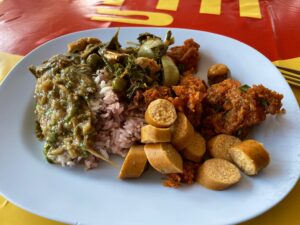By Josh Butterworth , Teacher in Phetchabun, Thailand
Earning over £750 a month in Thailand, a country in which the cost of living expenses such as rent and food are particularly low, living like a king is easy, right? Sadly, things aren’t always that simple. Only by being smart and sensible with the salary you earn, can you attain king like luxuries whilst keeping something in the bank for a rainy day, future plans or that trip you have always been planning. Even though a lot of us don’t do it, knowing how to be careful with money within one’s own country is easy enough…understanding how to save your precious pounds in a new and alien land where you cannot speak the native language, is a different prospect. After more than eight months in Thailand, in which time I have spent both wisely and frivolously, I am slowly starting to learn where money can be earned and saved. In this article, I will share with you some ideas on how to make living and working as an ESL teacher in Thailand, a financially productive move.
In my last article I wrote about the cost of living in Thailand: https://www.impact-teaching.com/blog/cost-of-living-as-an-esl-teacher-in-thailand/
Rent
Rent is one of the most significant monthly expenses, wherever you may be in the world, and although costs in Thailand are substantially cheaper than they are in the UK and Europe, it is still an area of spending that should be reduced as much as possible. Put simply, the best way to lower rent costs is to share a home with someone or a group. This is not always possible but should be a money saving opportunity seized if it is. Other than in large cities with big expat communities, such as Bangkok and Chiang Mai, finding an English-speaking person or people to house share with can be a challenge, so looking to colleagues is the best place to start. Usually, schools hire many foreign English teachers, who are all potential new house mates. Some of those teachers will already have living arrangements and may be off the cards, but situations change, and new teachers arrive throughout the year. Unlike in the UK, where I am from, rental agreements in Thailand seem to be temporary and people move with ease. Make sure you are clear with the landlord of the first place that you end up, that you are not willing to lock into a long-term contract, especially if the burden of paying the rent rests solely on your shoulders. Cohabiting makes sense, sharing a home reduces rent costs by at least 50%, and loneliness by a similar amount. Coming home and being able to have a laugh or unwind with someone makes life a lot easier and more pleasant.
Energy
 Following the global trend, the cost of energy in Thailand is rising. Since my girlfriend and I moved into our bungalow in January of this year, our monthly energy bill has more than doubled. Although the cost is still relatively low compared to what friends and family are paying back in the UK, a 50% increase should not be ignored. Heating is a necessity throughout most of the year in the UK, Thailand on the other hand has a different issue, cooling is a must. Other than lights, charging technology and using kitchen appliances, keeping cool is the most significant contributor to our energy bill each month. For a foreigner, who has not grown up in and become accustomed to a tropical climate, a home without air-conditioning or a fan…is not a happy one. And there lies the choice, air-conditioning or fan? There is a clear winner when it comes to energy saving. Fans use around 1% of the electricity consumed by air-conditioning. Leaving a fan on for 24 hours will use less energy than 15 minutes of air-conditioning. A decent fan costs around £20, a shrewd investment I would say. If a fan suffices then leave the air-conditioning alone, it’s better for your wallet and the planet.
Following the global trend, the cost of energy in Thailand is rising. Since my girlfriend and I moved into our bungalow in January of this year, our monthly energy bill has more than doubled. Although the cost is still relatively low compared to what friends and family are paying back in the UK, a 50% increase should not be ignored. Heating is a necessity throughout most of the year in the UK, Thailand on the other hand has a different issue, cooling is a must. Other than lights, charging technology and using kitchen appliances, keeping cool is the most significant contributor to our energy bill each month. For a foreigner, who has not grown up in and become accustomed to a tropical climate, a home without air-conditioning or a fan…is not a happy one. And there lies the choice, air-conditioning or fan? There is a clear winner when it comes to energy saving. Fans use around 1% of the electricity consumed by air-conditioning. Leaving a fan on for 24 hours will use less energy than 15 minutes of air-conditioning. A decent fan costs around £20, a shrewd investment I would say. If a fan suffices then leave the air-conditioning alone, it’s better for your wallet and the planet.
Food
Other than Thailand’s beautiful beaches and fascinating culture, it is the prospect of delicious food that entices hungry people from across the world to its shores every year. I can confirm that Thai food is not only delicious, but also very cheap. A meal at a local restaurant or street food stall will set you back around £1, so eating out for breakfast, lunch and dinner is very possible for under £100 a month. Follow the locals to find the best places to eat and don’t be shy, be brave. Ordering food from delivery apps such as Food Panda is also a great option if you’re feeling lazy but should be limited. Prices are slightly higher than eating out and portions are generally smaller, there is also a delivery fee that seems insignificant but can add up. However, as tempting and affordable as it may be to eat out all the time and get the odd delivery, it would not be great for your health. If possible, cooking should be incorporated into a routine. Basic food items from supermarkets are reasonably priced, but markets are where you will find the freshest, cheapest and most local food. Western and other foreign products are very expensive, and should be avoided as much as possible, this applies when eating out and getting delivery too. To keep spending down, I recommend a combination of cooking simple meals at home, eating out at local restaurants and occasional ordering a delivery from Food Panda. Also, an accumulation of small costs for snacks and drinks can add up to become a problem, easily missed in Thailand when things are so cheap. One of the most effective ways I have cut expenditure is by being mindful of the 50p or £1 I am spending here and there, on a coffee, packet of crisps or whatever. I ask myself if I really need whatever it is I want, and the answer is usually – no!
food is not only delicious, but also very cheap. A meal at a local restaurant or street food stall will set you back around £1, so eating out for breakfast, lunch and dinner is very possible for under £100 a month. Follow the locals to find the best places to eat and don’t be shy, be brave. Ordering food from delivery apps such as Food Panda is also a great option if you’re feeling lazy but should be limited. Prices are slightly higher than eating out and portions are generally smaller, there is also a delivery fee that seems insignificant but can add up. However, as tempting and affordable as it may be to eat out all the time and get the odd delivery, it would not be great for your health. If possible, cooking should be incorporated into a routine. Basic food items from supermarkets are reasonably priced, but markets are where you will find the freshest, cheapest and most local food. Western and other foreign products are very expensive, and should be avoided as much as possible, this applies when eating out and getting delivery too. To keep spending down, I recommend a combination of cooking simple meals at home, eating out at local restaurants and occasional ordering a delivery from Food Panda. Also, an accumulation of small costs for snacks and drinks can add up to become a problem, easily missed in Thailand when things are so cheap. One of the most effective ways I have cut expenditure is by being mindful of the 50p or £1 I am spending here and there, on a coffee, packet of crisps or whatever. I ask myself if I really need whatever it is I want, and the answer is usually – no!
Alcohol
Drinking is an expensive activity the world over, and reducing or cutting out booze will undoubtably save you money wherever you may be. I’m afraid that Thailand does not buck the trend. Walking out of the muggy evening heat into the bright lights and cool air-conditioning of a 7/11 store, the fridge full of brightly coloured and well branded alcoholic drinks is enticing, after all, you do need something to quench your thirst with on this warm evening. When the sun is shining and the clouds are nowhere to be seen, most days in Thailand, it is very easy to feel like you’re on holiday. A combination of that holiday feeling and a misconception that alcohol is cheap, can lead to overconsumption, and an attack on the bank balance. Just because a bottle of beer is 50p cheaper in Thailand than it is in the UK, does not make it cheap. Viewing alcohol as something to be enjoyed in moderation, as a treat, is the best way to save money. Not drinking at all would of course save more, but there is nothing wrong with enjoying an occasional drink, providing it is in a mindful and responsible manner. Basking in the joy of that holiday feeling without regular drinking is very possible, reminding oneself of this is the key to reducing spend on the sauce.
Budgeting
Sometimes, sticking one’s head in the sand when it comes to money can be easier than having an awareness of the cash sneakily making its way out of your account. Can I afford a new pair of shoes? Can I afford a takeaway? Instead of glancing at your bank balance and checking if you can, the money is already gone. But don’t worry, you’ll look great in your new shoes and the pizza will be delicious. Historically, I’ve been as guilty as anyone when it comes to doing this, but I’ve recently started to budget my salary each month, and have noticed a positive change. I feel a lot more confident with and in control of my money, which is definitely going further. Each month before payday, I list my unnegotiable expenditures, and how much they will roughly cost. These are things such as rent, energy, internet, moped rent, petrol and food. Once these costs are subtracted from my salary, I know what remains to do with as I please. Although not an unnegotiable, if I can, I add some savings to that list of expenditures. Experiencing all the best Thailand has to offer may not break the bank, but it isn’t free either. To enjoy weekend trips away as well as the longer holidays, which aren’t always paid, saving is essential. You will certainly need money for whatever post Thailand plans you have, and unfortunately, unexpected costs do inevitably arise. Saving is always a good idea and is made a lot more achievable by budgeting. Now, I do appreciate that sticking to a budget is easier said than done, but once acclimatised to a reduced and controlled spending routine, guilt disappears, and it is quite freeing. In my experience, it has been a failure to appreciate the small costs accumulating that has caused my overspending, I recommend budgeting as the most effective way to combat this issue.
shoes? Can I afford a takeaway? Instead of glancing at your bank balance and checking if you can, the money is already gone. But don’t worry, you’ll look great in your new shoes and the pizza will be delicious. Historically, I’ve been as guilty as anyone when it comes to doing this, but I’ve recently started to budget my salary each month, and have noticed a positive change. I feel a lot more confident with and in control of my money, which is definitely going further. Each month before payday, I list my unnegotiable expenditures, and how much they will roughly cost. These are things such as rent, energy, internet, moped rent, petrol and food. Once these costs are subtracted from my salary, I know what remains to do with as I please. Although not an unnegotiable, if I can, I add some savings to that list of expenditures. Experiencing all the best Thailand has to offer may not break the bank, but it isn’t free either. To enjoy weekend trips away as well as the longer holidays, which aren’t always paid, saving is essential. You will certainly need money for whatever post Thailand plans you have, and unfortunately, unexpected costs do inevitably arise. Saving is always a good idea and is made a lot more achievable by budgeting. Now, I do appreciate that sticking to a budget is easier said than done, but once acclimatised to a reduced and controlled spending routine, guilt disappears, and it is quite freeing. In my experience, it has been a failure to appreciate the small costs accumulating that has caused my overspending, I recommend budgeting as the most effective way to combat this issue.
Other than splitting the cost of rent with my girlfriend, which was always inevitable, I did not implement any of these other money saving strategies until many months after arriving in Thailand. If I had, I would certainly be a richer man than I am today. Small gains add up to great reward, this important ethos can easily be lost when moving halfway across the world to a country whose language you don’t speak and currency you don’t fully understand. I hope that the lessons I have learned empower you with the ability to save money from the moment you start your new life in Thailand, so that you can enjoy this beautiful country to its fullest.
 Would you like to teach English in Thailand? Explore our program page or submit an application
Would you like to teach English in Thailand? Explore our program page or submit an application




